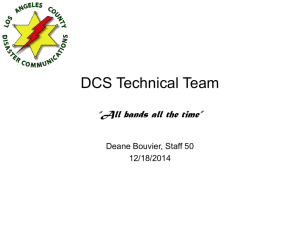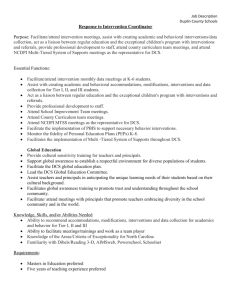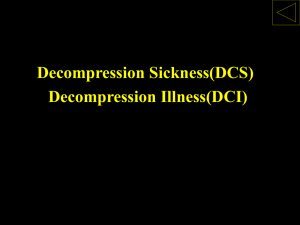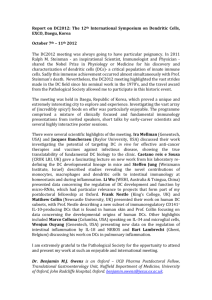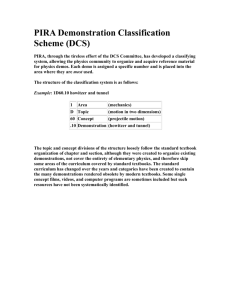Supplementary Figure Legends (doc 52K)
advertisement
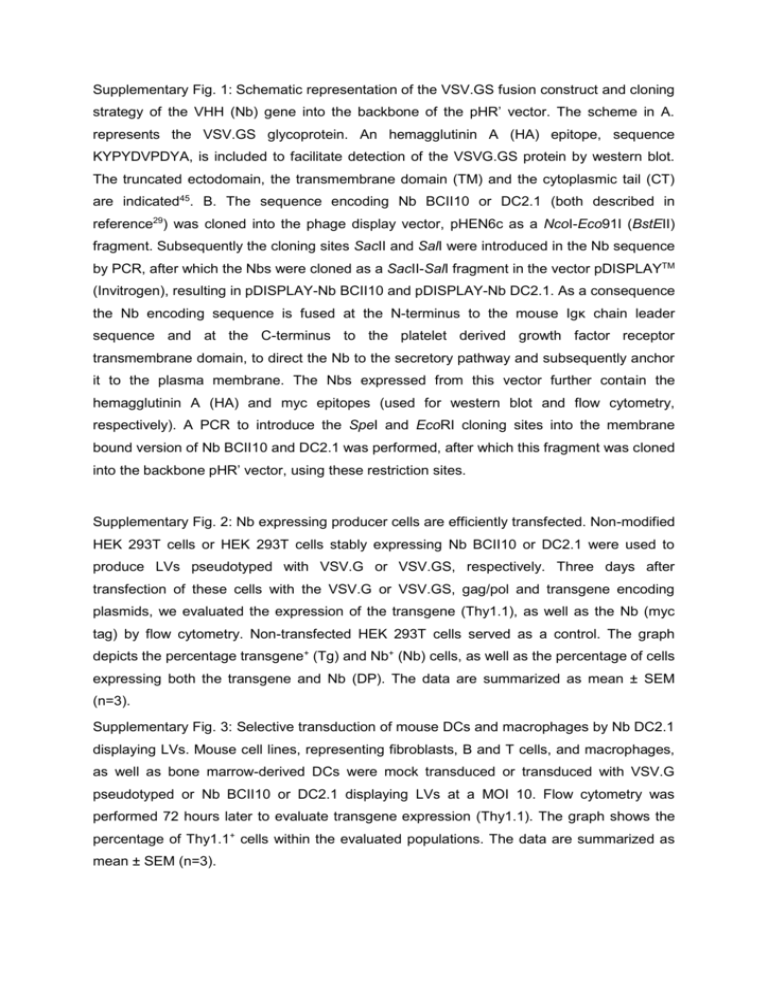
Supplementary Fig. 1: Schematic representation of the VSV.GS fusion construct and cloning strategy of the VHH (Nb) gene into the backbone of the pHR’ vector. The scheme in A. represents the VSV.GS glycoprotein. An hemagglutinin A (HA) epitope, sequence KYPYDVPDYA, is included to facilitate detection of the VSVG.GS protein by western blot. The truncated ectodomain, the transmembrane domain (TM) and the cytoplasmic tail (CT) are indicated45. B. The sequence encoding Nb BCII10 or DC2.1 (both described in reference29) was cloned into the phage display vector, pHEN6c as a NcoI-Eco91I (BstEII) fragment. Subsequently the cloning sites SacII and SalI were introduced in the Nb sequence by PCR, after which the Nbs were cloned as a SacII-SalI fragment in the vector pDISPLAYTM (Invitrogen), resulting in pDISPLAY-Nb BCII10 and pDISPLAY-Nb DC2.1. As a consequence the Nb encoding sequence is fused at the N-terminus to the mouse Igκ chain leader sequence and at the C-terminus to the platelet derived growth factor receptor transmembrane domain, to direct the Nb to the secretory pathway and subsequently anchor it to the plasma membrane. The Nbs expressed from this vector further contain the hemagglutinin A (HA) and myc epitopes (used for western blot and flow cytometry, respectively). A PCR to introduce the SpeI and EcoRI cloning sites into the membrane bound version of Nb BCII10 and DC2.1 was performed, after which this fragment was cloned into the backbone pHR’ vector, using these restriction sites. Supplementary Fig. 2: Nb expressing producer cells are efficiently transfected. Non-modified HEK 293T cells or HEK 293T cells stably expressing Nb BCII10 or DC2.1 were used to produce LVs pseudotyped with VSV.G or VSV.GS, respectively. Three days after transfection of these cells with the VSV.G or VSV.GS, gag/pol and transgene encoding plasmids, we evaluated the expression of the transgene (Thy1.1), as well as the Nb (myc tag) by flow cytometry. Non-transfected HEK 293T cells served as a control. The graph depicts the percentage transgene+ (Tg) and Nb+ (Nb) cells, as well as the percentage of cells expressing both the transgene and Nb (DP). The data are summarized as mean ± SEM (n=3). Supplementary Fig. 3: Selective transduction of mouse DCs and macrophages by Nb DC2.1 displaying LVs. Mouse cell lines, representing fibroblasts, B and T cells, and macrophages, as well as bone marrow-derived DCs were mock transduced or transduced with VSV.G pseudotyped or Nb BCII10 or DC2.1 displaying LVs at a MOI 10. Flow cytometry was performed 72 hours later to evaluate transgene expression (Thy1.1). The graph shows the percentage of Thy1.1+ cells within the evaluated populations. The data are summarized as mean ± SEM (n=3). Supplementary Fig. 4: LVs encoding Thy1.1 were administered (106 TU) to the inguinal LN in order to trace LV transduced cells. Analyses were performed 36 hours later on single cell suspensions prepared from these LNs. In order to evaluate Thy1.1 expression in macrophages, myeloid DCs and lymphoid DCs (together conventional DCs), plasmacytoid DCs, B and T cells the LN cells were stained with the antibody directed against Thy1.1 in combination with antibodies directed against CD11b F4/80, CD11c CD8, CD11c CD8, CD11c B220, CD19 and CD3, respectively. The graph shows the percentage of Thy1.1+ cells within the evaluated populations. The data are summarized as mean ± SEM (n=3). Supplementary Fig. 5: Selective transduction of human DCs and macrophages by Nb DC2.1 displaying LVs. A human cell line, representing fibroblasts, blood-derived B and T cells, and in vitro generated macrophages and monocyte-derived DCs were mock transduced or transduced with VSV.G pseudotyped or Nb BCII10 or DC2.1 displaying LVs at a MOI 10. Flow cytometry was performed 72 hours later to evaluate transgene expression (Thy1.1). The graph shows the percentage of Thy1.1+ cells within the evaluated populations. The data are summarized as mean ± SEM (n=3). Supplementary Fig. 6: Single cell suspensions prepared from human LNs were transduced in vitro with Thy1.1 encoding LVs (MOI 10). In order to evaluate Thy1.1 expression in macrophages, myeloid DCs, plasmacytoid DCs, B and T cells, these cells were co-stained with the anti-Thy1.1 antibody and antibodies directed against CD11b CD14, CD11c BDCA-3, CD123 BDCA-2, CD19 and CD3, respectively. The graph shows the percentage of Thy1.1 + cells within the evaluated populations. The data are summarized as mean ± SEM (n=3).
